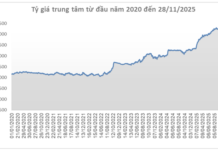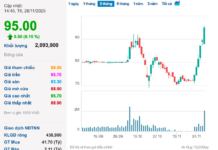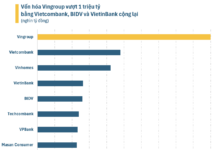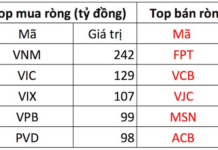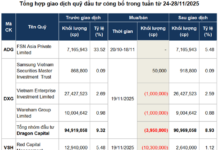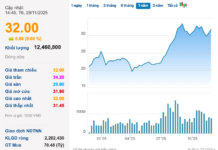Mr. Pham Xuan Hoe, General Secretary of the Vietnam Financial Leasing Association and former Deputy Director of the Banking Strategy Institute
To effectively curb money laundering in gold transactions, we need a multi-pronged approach beyond just non-cash payment regulations and gold invoices. A critical component is encouraging all citizens to transparently declare their income, making it more challenging for individuals to launder money through gold purchases.
Vietnam’s developing economy still relies heavily on cash, with a high cash-to-total payment ratio. This makes it all too easy for individuals to ask others to purchase gold on their behalf while maintaining the appearance of legitimate transactions. Reducing this cash ratio is a key step in our fight against money laundering.
Creating a shared database for various ministries to access is a complex and long-term endeavor, made more challenging by the reluctance of many ministries to share information. Clear definitions of roles and coordination mechanisms between ministries are essential, and we must learn from the experiences of other countries in managing their gold markets effectively.
Firstly, we must end the current gold monopoly and treat all businesses equally, provided they meet purity standards. The State should not be both a regulator and a market participant. While Decree No. 24 has helped mitigate the risk of “goldenization,” we need to separate the management of the foreign exchange gold market and the commercial gold market, clearly defining gold as a commodity, jewelry, or for transformation.
Secondly, transparency is crucial. We must limit cash transactions and enforce non-cash payments for gold, as per existing decrees. Implementing management tools, such as invoices and connecting gold shops’ computers with tax authorities, will enhance our ability to track and regulate the gold market.
Thirdly, effective coordination between agencies is vital to combat gold smuggling and market manipulation, which can lead to price volatility and instability. We must work together to implement comprehensive measures to address these issues.

Associate Professor Nguyen Huu Huan, Senior Lecturer, University of Economics Ho Chi Minh City
The “goldenization” of an economy poses significant risks, particularly to macroeconomic stability. Central banks worldwide have recognized the challenges posed by excessive gold reserves and are taking steps to reduce gold’s economic influence. Historical regulations in countries like the UK and the US have restricted gold ownership to prevent currency destabilization.
A key issue arises when gold is treated as a currency, as it complicates central banks’ monetary policy and macroeconomic stabilization efforts. Cultural norms, such as including gold jewelry in dowries, further contribute to the challenges faced by countries like China, India, and Vietnam. While China’s ample foreign reserves mitigate these concerns, India and Vietnam must implement measures to manage private ownership of pure gold, especially during economic downturns.
As a result, central banks are exploring various measures, including extreme acts like restricting private ownership of physical gold, to safeguard macroeconomic stability and the strength of their currencies.
Mr. Nguyen Van Phung, Member of the Central Executive Committee of the Vietnam Federation of Accountants and Auditors (VAA) and former Deputy Director of the General Department of Taxation
Any policy implemented must consider the interests of Vietnam’s 100 million people. Our focus should be on facilitating smooth business operations, encouraging financial flows, and supporting economic stability. Introducing new taxes that may incentivize individuals to convert their money into gold reserves is counterproductive and detrimental to our economic goals.
Our current tax framework for business operations and gold trading is comprehensive, but effective management is key to ensuring fairness for all stakeholders. We must improve tax administration to prevent revenue losses and address issues like underreporting of sales and income taxes by gold shops. This evasion reflects shortcomings in oversight and accountability, which can be improved through better management.
To effectively manage the gold market, we should adopt measures driven by public demand. Consumers consistently request invoices from gold shops, regardless of transaction size, as proof of purchase and to enable future sales. We are already mandating electronic or integrated invoices to transmit data to tax authorities, and tax agencies are working diligently to implement these systems.
Additionally, effective management requires the involvement of political institutions, as relying solely on tax authorities is insufficient. Increased collaboration and data sharing between state management agencies will enhance our ability to monitor and accurately record transaction volumes, improving transaction management and, ultimately, increasing state budget revenues.
Effective tax management also entails identifying transaction participants, understanding buyer and seller behaviors, and tracking quantities. This data will strengthen societal management and bolster our efforts to combat money laundering.
Lawyer Nguyen Thanh Ha, Chairman of SBLaw
Globally, many countries operate gold markets through various trading platforms, and tax authorities collect taxes based on these transactions. While taxes are essential for managing the gold market, they are not a panacea for overseeing trading platforms. We must also have robust legal provisions in place to prevent tax evasion and money laundering.
In Vietnam, gold trading enterprises must list prices according to State Bank of Vietnam (SBV) regulations, and the Law on Anti-Money Laundering mandates reporting transactions over VND400 million. With the introduction of electronic invoices, all gold transactions must now be connected to tax authorities, providing valuable data for preventing tax evasion and money laundering.
A recent government decree on non-cash payments further enhances our anti-money laundering efforts. We can learn from global gold market management practices to address domestic price disparities and meet public demand for regulated gold trading platforms. However, we must also be mindful of the potential risks associated with conditional gold trading platforms, including fraud and economic instability.
Mr. Nguyen Van Duoc, Director General of the Trong Tin Accounting and Consulting Company and Standing Member of the Executive Committee of the Vietnam Tax Consultants’ Association
Vietnamese law currently treats gold solely as a commodity subject to full taxation, unlike other countries that allow gold investments. To broaden the tax base on gold, we need to review and adjust our laws, treating gold as an investment and establishing investment channels. Effective gold market management should focus on three key aspects:
- Establishing clear standards for quality and labeling if managing physical gold as a commodity.
- Strict management of input and output invoices to track gold movement.
- Regulating cash flow by requiring non-cash payments during gold transactions to promote transparency and reduce the risk of money laundering.
Small household-operated gold shops often lack strict invoicing practices, and we propose mandating non-cash transactions for gold purchases and sales. This will not only improve transparency but also aid in tax administration, reduce revenue losses, and prevent underreporting and tax evasion.
Effective management of gold businesses relies on overseeing the supply chain and supervising sales transactions. Regulating both transactions and payments is critical to preventing loopholes, and enhancing rules for non-cash transactions in gold is vital to achieving sound market management practices.
The Ministry of Finance to implement new regulations to upgrade the stock market
Deputy Minister Nguyen Duc Chi stated that in order to achieve the goal of upgrading the stock market as soon as possible by 2025, the Ministry of Finance and relevant ministries need to actively implement preparatory tasks in 2024.
Minister of Finance Hồ Đức Phớc: Aiming to upgrade the stock market
In the exchange in the early days of the Year of the Snake 2024 with the Financial Market and Monetary Journal on the orientation of the stock market’s development, especially upgrading the stock market in the near future, Minister of Finance Ho Duc Phoc emphasized that for the Vietnamese stock market to be upgraded, besides the efforts of the Ministry of Finance, strong direction from the Government, the Prime Minister and the cooperation of many ministries, sectors and businesses is crucial. As the leading agency, the Ministry of Finance is urgently and resolutely working towards this goal.
Deputy Governor: New Law Empowers Public to Monitor Banks
Deputy Governor Thai Son Do evaluates the amended Law on Credit Institutions as creating conditions for public oversight of manipulative and abusive activities by banks.






